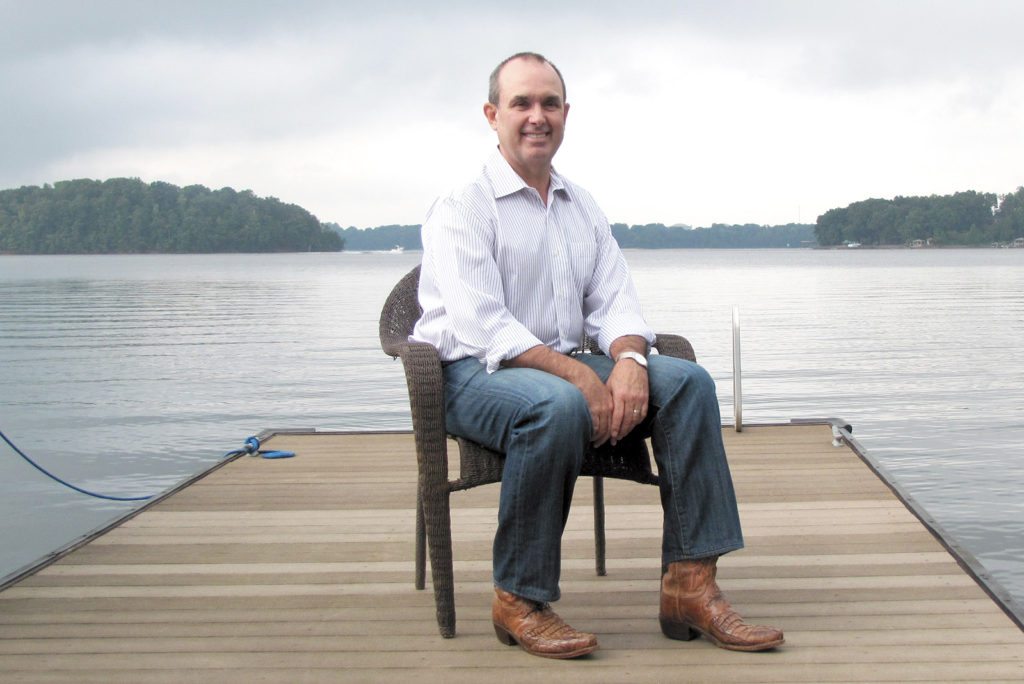
Jeff Tarte
Dec. 8. By Dave Yochum. Former Cornelius Mayor Jeff Tarte—he was also our first NC District 41 Senator—will be the volunteer chair of the Lake Norman Chamber of Commerce in 2024 in addition to a candidate for NC State Auditor.
Always an interesting person regardless of one’s politics, the Republican thought leader says he hopes to get the chamber’s 1,000 members more connected, engaged and inspired next year.
As NC Auditor, he said he will call out improper financial management while remaining unbiased to party and politics.
“This is about doing the right thing by bringing to light those who cheat and steal state money,” he said.
If he is elected—and wins the primary in March—he would replace Beth Wood, a popular Democrat who ran afoul of rules around personal use of a government vehicle and said she would resign as of Dec. 15.
Before delving into politics—three terms as mayor of Cornelius and three as NC Senator—Tarte was a sales executive with IBM and a partner at Ernst & Young. He ran his own healthcare consulting company and sold it.
His first job was working in his dad’s TV and boat shop, an unusual combination.
“When summer reruns came on everybody went boating. I helped deliver new TVs, made service calls in people’s homes as well as repaired boat engines and rigged new boats,” Tarte said.
He learned how to service and repair outboard motors.
“Please do not call me if your boat motor conks out, I will be no help, as I forgot everything I ever knew about outboard engines,” he said.
Now he has his own management and government affairs consultancy practice.
As chamber chair, he said he is dedicated to innovation in the small business and corporate communities.
How will you bring your background to bear as NC Auditor?
As State Senator I authored legislation that required the six largest departments in the North Carolina government to undergo an independent financial audit (IFA) every two years. Many of these agencies had not undergone an IFA in decades. The first one performed for the Department of Health and Human Services identified millions of unaccounted-for money. I will advocate for all state agencies and departments to undergo regular independent financial audits and reviews.
Can you characterize the past 4-5 years locally?
Purple Haze. COVID felt like a psychedelic experience we survived. We will forever be traumatized by the phrase, “mask, wash hands and maintain three feet distance.” For a long time we will be feeling the impact of learning loss in our schools, businesses permanently shuttered and the after-effects of the Paycheck Protection Program (PPP) as well as the Economic Injury Disaster Loans (EIDL). On top of all of that we add the increase in traffic congestion due to population growth and no corresponding investment in roads.
What are your thoughts on the next 4-5 years?
It feels like we are impacted by world events more than usual. New conflicts around the globe pull resources and radically increase our national debt. This will continue for the next few years. SBA loans become more expensive and difficult to secure. The Presidential election will have repercussions for the rest of this decade. Work From Home will reduce as folks Return To Office. The 20- and 30-somethings will frequently change jobs. Road infrastructure will see a number of projects begin. We see the continued trend of consolidation of mega health-care systems. Personal physicians become a thing of the past as AI and bots provide better routine care. Medical debt and bankruptcy from health care will be fixed by legislation. Medicaid will provide health care insurance for 20 percent of all North Carolinians. In 10 to 15 years the Internet as we know it will cease to exist. It will be replaced by far more sophisticated technology we cannot imagine at this moment.
What’s your outlook for the national economy in 2024?
Similar to 2023. Out-of-control federal spending continues. State and local spending is balanced and thoughtful. Some 75 percent of Congress—Democrats and surprisingly Republicans—have no intent to slow spending. Our state legislature and local municipalities are prudent stewards of our tax dollars. Monetary supply under the control of government is the fuel that feeds inflation. Our national economy will continue to be impacted by Russia, Iran and China. Small businesses, as has been our history, are the linchpin of our economy and economic growth. Following housing markets and new business start-ups will be the top indicators to see which way the economy heads in 2024. Education, finance, health care and retail industries will see transformative change with the introduction of new technologies, most notably AI.
Your outlook for the region?
Charlotte is a microcosm of the Southeast. The Charlotte and Raleigh regions for the foreseeable future will be the economic engine that drives not just the rest of North Carolina, but the entire Southeast. We enjoy low corporate and personal income tax rates as compared to our regional neighbors and across the nation. Our workforce is highly educated and skilled. Our state and local governing bodies produce balanced budgets with spending under control. We need to keep an eye on office space demand. Housing costs are a focus of attention and housing density will increase locally. Work forces are migrating at a faster pace to metropolitan areas. Technical schools gain respect and popularity. Rural counties struggle and it will get worse. Three counties are literally dying with death rates higher than birth rates. Twenty-six of 100 North Carolina counties have no obstetrician. Big cities will economically rule. North Carolina and our region are recognized as the No. 1 place to start and operate a business. Being the top state for business will continue for some time. Last, the two most important economic engines in our region are the 12 universities and the airport. Continued investing in both resources will assuredly be imperative.



